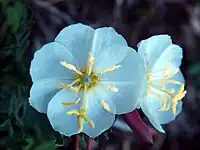Oenothera albicaulis
Oenothera albicaulis is a New World plant in the evening primrose family. It is known by the common names prairie evening-primrose,[2] white-stem evening-primrose,[1] whitish evening primrose,[3] or whitest evening primrose.[4]
| Oenothera albicaulis | |
|---|---|
| Scientific classification | |
| Kingdom: | Plantae |
| Clade: | Tracheophytes |
| Clade: | Angiosperms |
| Clade: | Eudicots |
| Clade: | Rosids |
| Order: | Myrtales |
| Family: | Onagraceae |
| Genus: | Oenothera |
| Species: | O. albicaulis |
| Binomial name | |
| Oenothera albicaulis | |

Oenothera albicaulis
Distribution
Oenothera albicaulis is native to North America, in the United States (Arizona; Colorado; Montana; New Mexico; Oklahoma; South Dakota; Texas; and Utah), and in Mexico (in Chihuahua state).[1]
Uses
The Zuni people rub the chewed blossoms on the bodies of young girls so that they can dance well and ensure rain.[3]
References
- Oenothera albicaulis was originally described and published in Flora Americae Septentrionalis 2: 733. 1814 [1813] "Oenothera albicaulis". Germplasm Resources Information Network. Agricultural Research Service, United States Department of Agriculture. Retrieved April 7, 2013.
- "Name - !Oenothera albicaulis Pursh". Tropicos. Saint Louis, Missouri: Missouri Botanical Garden. Retrieved April 7, 2013.
- Stevenson, Matilda Coxe (1915). "Ethnobotany of the Zuni Indians". SI-BAE Annual Report (30): 87.
- USDA, NRCS (n.d.). "Oenothera albicaulis". The PLANTS Database (plants.usda.gov). Greensboro, North Carolina: National Plant Data Team. Retrieved 21 July 2015.
External links
- Picture of an Oenothera albicaulis flower, from Vascular Plants of the Gila Wilderness in association with Western New Mexico University Department of Natural Sciences
This article is issued from Wikipedia. The text is licensed under Creative Commons - Attribution - Sharealike. Additional terms may apply for the media files.